- Home
- Gregory Maguire
Confessions of an Ugly Stepsister Page 10
Confessions of an Ugly Stepsister Read online
Page 10
“So you notice Clara’s unhappiness, at least,” says Iris.
“Put it like this,” says Margarethe. “If Ruth is trapped by her afflictions, to hobble and bawl through all her days, Clara is trapped as well. She’s expected to be endlessly docile. Who knows why—because she’s so attractive? We’re all in our own prisons, I suppose, but Clara’s is made worse for her by the fears and strengths of her mother. And maybe by her father’s weakness.”
“And what is the shape of your prison?” says Iris.
Margarethe rubs her nose and says, “There was always a window. You can endure any sort of prison if you can apprehend a window in the dark. Your father was that window for me. When he died, the window was shut. Oh, I know, you ache at the mention of Jack Fisher, but even so.”
“You’re going to go the rest of your life without another window somewhere in the dark?”
“You look for it,” says Margarethe, suddenly impatient with such prattle. “I’m busy now. I have to skin this brace of hares.”
Iris sits at her mother’s side and watches. “Tell me what to do, I should know about this,” she says.
“So you may find yourself at home in some burgher’s kitchen when you are my age, preparing food for guests who won’t see your face or ask your name,” says Margarethe. “Why should I teach you a whit of it?”
“Because I’m ugly,” says Iris, “and I have to know these things, so I can take care of myself someday.”
Margarethe runs her hands over the hares as if she is trying to keep from tearing them apart with her fingers. She breathes heavily. Then she says, “Well, then, my dear, look carefully.”
Mother and daughter labor over the carcass, removing unwanted extremities, bones, organs. Margarethe shows Iris how to peel back the skin of the skull, how to handle the flesh so it doesn’t pull away from the bone too soon, how to rub scatterings of sage, thyme, and tarragon, to turn a dead animal into a sumptuous meal. After a while Henrika pads back into the kitchen. They all work side by side without speaking, selecting the most perfect fruits, withdrawing the bread from the side oven, hurrying with the newly purchased quails, for the hour is approaching when Young Woman with Tulips will be unveiled for the ravenous merchants.
Reception
The candles are lit, the tables spread with linen, and Henrika has seated herself at the virginal. “What a pretty picture,” says Margarethe to van den Meer, but he doesn’t hear the sourness in her voice, and he merely answers, “Oh, yes, isn’t she?”
Two maidens from a household down the street have come to assist in the serving, so Margarethe can stand at the door and supervise both kitchen and dining salon at once. Caspar has been engaged to collect cloaks and staffs and hats. Iris and Ruth bring stools to the doorway and sit there, wondering about Clara, until at last there’s a knock on the door and the first of the burghers arrives.
Almost at once a second guest knocks, and his wife behind him, so Caspar is kept busy, and Iris has to help. Henrika pauses at the virginal as if surprised by visitors. She plays the same melody each time until she is stopped by the new arrivals.
The Master appears. His new coat with its bit of braid can’t disguise his fretfulness. He makes a round about the hall, greeting those he knows, mumbling shy hellos to strangers. Almost at once he escapes to the kitchen, where he shucks off the new coat and sits on the stool that Iris has vacated. He holds Ruth’s hand for a bit.
“They’re a worthy lot,” says the Master to Margarethe, who, though in the midst of last-minute preparations, takes a moment to sneer.
“Stuffed pheasants and perfumed peacocks, full of airs. They’re only merchants, not nobility,” says she.
“They admire the talented and they count themselves as learned. Do you know that some of them have invested in the settlement of the New Netherlands across the tremendous Atlantic?”
“They have an uncommon passion for paintings, these Dutch,” says Margarethe, as if in this instance she understands herself to be entirely and safely English.
“And why shouldn’t they?” asks the Master. “The marvelous Reformation has torn away icon and ornament from the churches. What’s left for the hungry eye to admire? My fellow Dutchmen make do with tedious scenes of the merry company. Scenes of meadow, woodland, the lot of the common husbandryman. Views of the city from this aspect or that. Or views of the comic lot of the desperately poor.”
“If your painting is met with approval,” says Margarethe, “just watch: You’ll paint all of that. You’ll spend your time gazing on the thick jowls and the double chins of everyone with guilders enough to pay you for their likeness.”
“Don’t remind me,” says he. “My possible patrons are out there in the reception room right now.”
“There’s no shortage of subjects, Luykas, nor of coin to pay you for painting them.”
“There’s no shortage of painters in this part of Holland either.”
She lays a pair of poached salmon on a salver and works them with her fingers to move the flesh back into correct form. “So you have a mixed mind? Like most of us. You want the work and the reputation, and you also want to despise your patrons for refusing to pay for religious subjects. This way you can be unhappy whatever happens next. Here, girl, this is ready; don’t let the fish slide off onto the floor. Ruth, move your feet.”
“You’re a clever woman, Margarethe,” says the Master. “If I’m honored and noticed tonight, as van den Meer suggests I will be, would you think of returning to my household and doing for me?”
“I think many things, silly and profound, each night as I put my head down between my daughters to take my rest.”
“Well, add this proposal to your list.”
Van den Meer is at the door. “Schoonmaker, we’re going into the next room to show them your work,” he says, “and you here gabbling in the vegetables like a soup boy? Get out here and prepare, at your advanced age, to make your career, and to make mine as well.”
Van den Meer calls for Clara. When she doesn’t come, he says to Margarethe, “Fetch her, please; she’s upstairs and has to come down at once.”
“I’m the princess of the pots and the hearth today, I’m not the nursery maid,” says Margarethe. “Do it yourself.”
“Though I’m distracted by the occasion,” he replies formally, “I’m not insensible to insult, Margarethe Fisher.”
Margarethe blushes; she’s gone too far. She says in a low voice, “Iris, you do what’s required now, in my stead.”
Iris hurtles up the back stairs of the house. She goes to Clara’s small chamber. The curtains of the bed nook are drawn. No candle is lit here, and shadows blunt the hard edges of the furniture.
“Clara?” says Iris. “Are you within?”
A rustle of bedclothes. Something is there.
“Clara?” Iris’s voice is softer, frightened. “Come, open the curtains. Don’t scare me so.”
The twitch of the drape. The heave of labored breathing. Iris sweeps aside the cloth.
“Oh, come, what’s the harm?” says Iris. She looks in and tries to smile.
The figure draws back, deeper into the shadows. “I hate them,” says Clara.
“But why do you hate them? What have they done to you?”
“They walk about the world with such big steps,” she says at last. Iris wonders if she means that they can stalk the world to their hearts’ content without the supervision that every child chafes under, Clara more than most. But this is the way with grown people. It hardly seems a reason to hate them.
“If you go, and smile,” says Iris, “and answer when you’re spoken to, you can amuse them, and gratify your parents. Then when their attention is turned, for adults never think about one thing for long, you can walk away. They’ll never notice.”
“They already have me once,” says the girl.
Iris says, “In the Master’s painting. I know. I know. But you’re beautiful enough to be seen in the flesh. Can’t you be happy for that?”
“My father will sell his flowers,” says Clara. “We’ll become much wealthier than we are. I’m caught on that canvas to sell flowers.”
“And so what does that matter?” says Iris. She has meant to be kind, but she’s losing her patience. “When I was caught on a canvas by the Master, people laughed! There are worse things in the world than being a joy to behold and a use to your mother and your father.”
“What would you know,” says Clara, beginning to look wild, “your father is dead.”
“None of that,” says Iris, who is learning, “none of that!”
“Dead father, worms in his mouth, maggots in his eyes—”
“Come out of your bed,” says Iris, “you little limb of Satan, come out; for if you don’t, my mother and my sister and I will be thrown from your house for being unhelpful. And yes, my father is dead, and we can’t afford to lose our position here. So if you won’t descend the stairs for your own parents, for the sake of your future, then do it for me. Am I to be sent back to England, there to starve?”
It’s a clumsy gambit, but it works. Clara throws her arms around Iris. “Don’t go back to England,” she says. “Learning English with you is the only joy I have.” But the hug she gives Iris is hard and strong. The girl has arms like iron bars.
Iris goes on, trying not to flinch in Clara’s embrace. “You would understand the joy of a full larder if you had ever had to live without one, and the joy of a living father if your father were dead. Let’s not talk about this now. Come. Be brave like a girl in one of my stories.”
So Iris pulls Clara down the back steps to the kitchen. Margarethe straightens Clara’s clothes and pinches her cheeks. Van den Meer smiles vacantly, murmuring, “Follow me, duckling. We are just going in to view our future.” Clara turns and looks one last time at Iris. Her eyes are nearly hollow. Her pretty upper lip twitches, twice.
Virginal
By the time the last guest has left, Clara is dead to the world, and Iris is barely awake herself. Ruth has crawled under the kitchen table and snores there in her ungainly way, her windmill fallen from her grasp. “It’s the latest I’ve ever been up . . . the world is so still,” says Iris, peering from the doorway. “Look, the stars almost clatter against each other, there are so many.”
The Master calls for his coat. He’s drunk and depressed over being so well celebrated. His apprentice, though, is giddy with relief. “Has it been a good evening, then, Caspar?” says Iris as Caspar supports the Master and slides an arm through his.
“The portrait of Clara excited everyone. It’s the start of his career all over again,” says Caspar. “If he doesn’t choke in his sleep tonight, he’s a made man. Your mother should consider his suggestion that she return to his household. He’ll be able to afford it.”
Iris doesn’t know what she thinks. She’s torn: the pleasure of being near the act of painting, or the benefit of a more assured schedule of meals in Henrika’s well-run household? She answers Caspar merely with a happy shrug.
He leans down and puts his hand fondly on her brow. “You’re a good child,” he says. Then he and the Master depart, noisily, in streets that are slippery with a fine spray blown in from the midnight sea.
The door shuts, and Iris moves into the hall. Cornelius, Henrika, and Margarethe stand at various places in the room, their backs to each other: Henrika at the virginal, Cornelius before the painting, and Margarethe near the table littered with the pips and stems of the fruit and the rind of the cheese that finished the meal.
Though the adults are standing and facing in three directions, they’re attending to each other too, in some way that Iris can’t fathom—oh, she is sleepy! But she notices that Margarethe’s hands at the table are dallying, not from exhaustion but from an effort to linger.
“We’ve had our triumph tonight, all of us,” says van den Meer.
Henrika bows her head to the virginal. Margarethe nods her own head but doesn’t answer.
“It’s the beginning of our success, do you know what this means?” says van den Meer. “We were right to move slowly and to be sure that he was up to the job, that Schoonmaker. Our caution goaded him on. He surpassed every effort to date. He will not be known as the Master of the Dordrecht Altarpiece. He will be Schoonmaker, and Young Woman with Tulips will be admired and visited from afar. Soon we’ll find the right venue in which to show it. People from as far away as Florence and Rome will admire it, and admire our Clara—and we will have no shortage of future investors either.”
“I hate the thought of it being shown,” says Henrika. Van den Meer doesn’t reply, and his wife continues in a quieter tone. “She’s never going to be more beautiful than she was tonight.”
At this van den Meer turns and drains a glass of port. “What do you mean? Are you sad over the child’s growing?”
She shakes her head. Van den Meer says, “There’s the new baby to make you happy, as Clara emerges into her adult station. It’s time for that.”
“It’s just that now,” says Henrika, “Clara’s beauty is announced. The reputation of it will precede her, even in this street.”
“You couldn’t wrap her in shawls forever,” he says. “It’s been all these years till you would agree to another child, and if you’d done it sooner, Henrika, you might have found a way to release your loving claws off Clara before this. Let’s hope she can straighten out and thrive.”
Henrika looks furiously sad. Van den Meer continues in a kinder voice, “She’ll be at home in any salon in the land; she’ll be welcome in France and England. She’ll be a credit to your family and to mine. She won’t be able to help it.”
Henrika turns her face. In the last of the candlelight, Iris can see that tears are glistening. “Have we done well, husband?” she asks.
“Wife, we have triumphed, each one of us,” says van den Meer. “Nothing is lost tonight, and everything gained. Schoonmaker walks away with appointments for five studio visits from merchants wealthy enough to pay him handsomely for his work. We’ve elevated our status here—”
“You’ve elevated your status,” she says softly, reminding him that her bloodlines are too pure to be further purified.
He rolls over her remark, continuing, “—and we’ve impressed our colleagues with our ability to draw attention to our own stock of tulips. We’ve secured the rest of our investment. We’ve introduced our daughter and launched her reputation as a figure of renown. We’ve worked hard for this, and there’s nothing to be dismayed about. The conversation was brisk, the wine sweet, the food plentiful and delicious—”
“—Thank you,” says Margarethe.
Van den Meer and his wife both look over at her. “You are indeed responsible,” says Henrika, with no derision in her voice; she is too tired to squabble. “We’re beholden to you for your skills.”
“And to your daughter for befriending Clara and encouraging her to come forward,” says van den Meer.
“Then would this be the right time to approach you for a modest stipend?” says Margarethe.
“It’s late, and I don’t discuss such matters when I’ve been eating and drinking in such a full manner,” says van den Meer.
“Besides,” says Henrika, “this fine evening alone cost the household more than we could afford. And the new baby is on its way, and you know the fuss of that. Isn’t it enough that you have a place to sleep and food to eat?”
“It is . . . gratifying,” says Margarethe. “But my daughters are a little older than your Clara, and they don’t have your Clara’s advantages. Put baldly, with their sorry looks, they are millstones around my neck. I have to think of them.”
Iris shrinks back within the shadows. She doesn’t like to hear such words.
“In any event,” says van den Meer, “let’s not mar this pleasant evening by such a discussion. Another time, Margarethe, tomorrow or the next day, find me in my hall and we’ll consider the matter. I make no comment one way or another.”
“But tonight I’ve received
an offer of employment elsewhere,” says Margarethe.
“Not from one of our guests!” says Henrika.
“Tomorrow is time enough, Henrika,” says van den Meer.
“It’s not to be endured,” says Henrika. She sits up straight and holds her belly.
“It was from one of your guests,” says Margarethe.
“Who?” says Henrika, in a passion.
“Henrika,” says van den Meer warningly.
“It was from the Master. He believes that after tonight he’ll be in a better position to afford to hire me as help. He’s requested my return.”
“Go then, go, if you must,” says Henrika dismissively. “The ungratefulness!”
“We’ll take this matter up in the morning,” says van den Meer. “Margarethe, you’re not doing the best for yourself.”
“I don’t ask to do the best for myself, only a little better than nothing,” says Margarethe. “You’ve had a great success tonight, and you think you’ll have more in the months to come. You’ll be better prepared to reward a small staff. You’ve seen how I can serve, and serve I will.”
“I protest this, Cornelius,” says Henrika.
“You’re too tired to protest, and you are with child,” says her husband. “I will make the decision that needs to be made, and I will not make it tonight. How often have I to tell you this? Come, all, the lights are to be put out, the shutters barred and the food covered against the mice, and then to sleep. Our life begins again in the morning, as it always must.”
“Who makes the decision that needs to be made?” asks Henrika as she blows the candle out. Iris sinks back in the darkness, ashamed of her mother’s gall, but also proud of it.
Simples
“Clara’s face is lengthening,” says Margarethe. “If you still harbor some fancy that she is a changeling, Iris, notice that Clara is growing up. Changelings die young.”

 Missing Sisters
Missing Sisters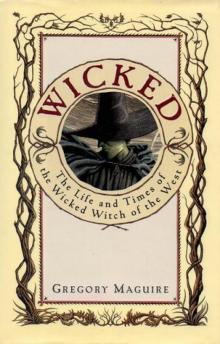 Wicked: The Life and Times of the Wicked Witch of the West
Wicked: The Life and Times of the Wicked Witch of the West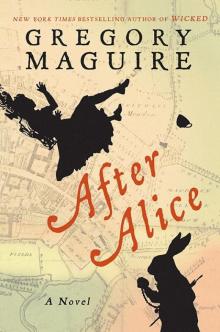 After Alice
After Alice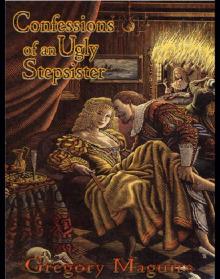 Confessions of an Ugly Stepsister
Confessions of an Ugly Stepsister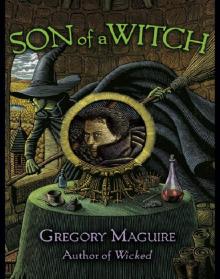 Son of a Witch
Son of a Witch Matchless
Matchless The Next Queen of Heaven
The Next Queen of Heaven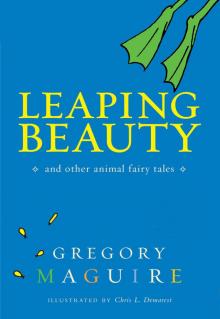 Leaping Beauty: And Other Animal Fairy Tales
Leaping Beauty: And Other Animal Fairy Tales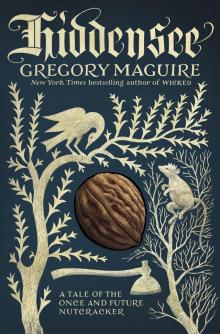 Hiddensee: A Tale of the Once and Future Nutcracker
Hiddensee: A Tale of the Once and Future Nutcracker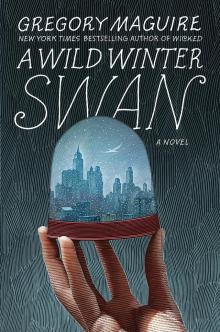 A Wild Winter Swan
A Wild Winter Swan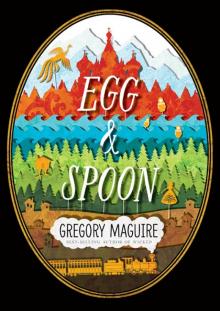 Egg & Spoon
Egg & Spoon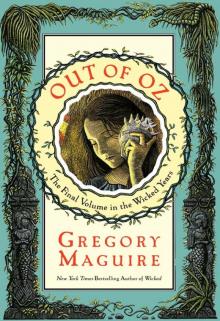 Out of Oz
Out of Oz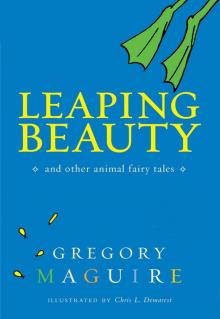 Leaping Beauty
Leaping Beauty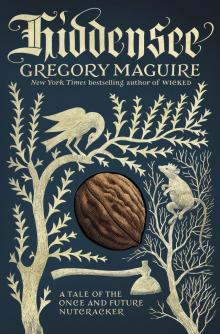 Hiddensee
Hiddensee The Wicked Years Complete Collection
The Wicked Years Complete Collection The Next Queen of Heaven: A Novel
The Next Queen of Heaven: A Novel